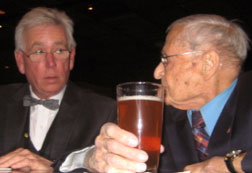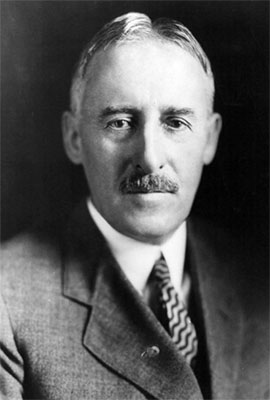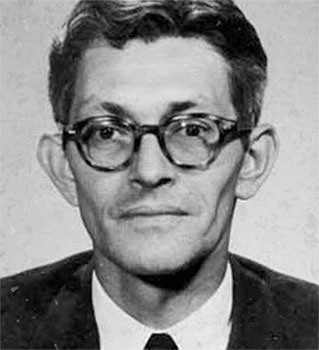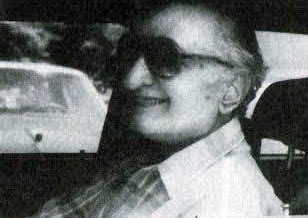Counterintelligence

(Vic and Mac Showers at the Willow Bar, 2010).
Willow was quiet that Thursday Afternoon. The weather outside was raw and damp, so the patio was deserted. Without the constant coming and going to serve the tables out front, Jasper was hanging out behind the bar with Big Jim working the taps and pouting out wine. Mac was wearing a new red sweater of which he was quite proud, and all the Willow ladies- Jamie, The Lovely Bea, Heather-2 and Liz-with-an-S told him he looked quite dashing.
The usual line-up of the regulars were at the Amen Corner- Old Jim anchored the apex, John-with-an-H was on his second or third glass of Happy Hour red, and Short Haired Mike was bemoaning a road trip he had to take to Fort Bragg, where he had been stationed as a Ranger back in his active duty days. Jar-Head Ray was enjoying a cocktail after a trying day at the QWEST Building across Fairfax drive, next to Mac’s residential tower. He was telling the story of Long-haired Mike, who was recovering after some godawful failure of his immune system that kept him away from human contact.
It seemed like a good time to catch up on the things he was willing to discuss about his time at CIA after the Navy. I picked up my pen and grabbed a stack of white cocktail napkins. “So I take it you were no fan of Stansfield Turner when the Admiral was named the Director of Central Intelligence.”

(American Statesman Henry L. Stimson).
Mac snorted. “It was the Carter years, and there was very much a sense that we had gone back to an approach taken by Henry L. Stimson.”
“Was he the Secretary of War who observed that “Gentlemen don’t read other gentelmen’s mail?”
“The very one. Turner came to Langley and devoted most of his first year to the reorganization of the agency and didn’t devote too much time to the activities of his IC Staff, except in the budget area. Turner got Mr. Carter to issue him a very clear and specific mandate to manage and be responsible for the total national intelligence program and budget.
It had existed before, but Turner got it direct from the First Customer clearly and authoritatively. He was adamant that the Directors of NSA, DIA, and the other national intelligence authorities would report to him.”
“And the alternative was to get hammered in the budget process?”
“Precisely,” said Mac, looking a little wistfully at the Lost Rhino craft-brew IPA Big Jim was drawing for Jake, the former Director of DIA who was chatting with Jon-without down the bar. It only took a moment, and Mac decided the heck with his oncologist and ordered one.
“Turner might not have known very much about intelligence, but he did know how to make people respond when the money was being doled out. I felt, and I still feel, that Admiral Turner never really did come to understand the intelligence community or the process by which it operated or even the systems we used to collect information. I used to say, jokingly, “I’ve forgotten more about intelligence than Stan Turner ever learned in four years as DCI,”
“It has been my experience that you have not forgotten anything,” I said, taking a sip of a delicious crisp Pino Grigio.
“That’s a pretty heavy statement,” he said reflectively. “There was a lot going on as we got closer to the election. I don’t recall specifically, but I think it was in 1978 or 1979 that a CIA counterintelligence expert was detailed to the staff from the FBI by the name of Al Watters. As part of the fall-out from the Rockefeller Commission in 1975, DCI Turner directed him look at counterintelligence capabilities of the intelligence community and make an inventory — a total inventory — of counterintelligence resources, capabilities, personnel, whatever, throughout the intelligence community.”
“Military Departments, too?” Mac nodded and took a sip of his Virgin Mary. My favorite Democrat, Daniel Patrick Moynihan, used to say that Russian intercepts and wiretaps constituted “the most massive illegal invasion of Fourth Amendment rights in American history.”
“Until now. But he was right. Watters looked at everything- FBI, CIA, Army, Navy, Air Force, whatever. It was a long and a difficult task. It was complicated because it was a scenario where a lot of the agencies maybe didn’t want to tell him too much detail. But to the best of their ability over time, they put together this inventory of counterintelligence capabilities. I got a little drawn into their effort because of some of the work I was doing had a tangential bearing on what they were doing, and I was interested in what they were doing and kind of looked over their shoulders.”
“I am sure they appreciated the interest,” I said with a laugh. “Bureaucrats! I am thinking an order of the miniature fish-and chips would make a nice snack. Nobody does tempura batter better than Tracy O’Grady’s kitchen.”
“A fellow named Rusty Williams was a special assistant to Stan Turner, was also interested in what Watter’s team were doing. When they finished that task, they needed somebody on the IC Staff to champion their cause, and I kind of fell into that position. In fact, they asked me to help them convince people of the importance and significance of their product. We did so, and Rusty Williams was our conduit to the DCI. The position evolved over time, and Turner created a Special Assistant for Community Counterintelligence.”
“We had to do that again. They call it the National Counter-Intelligence Executive. We helped with their budget formation when the office was created after 9/11. We sure had some spies in between, these two attempts to deal with Russian spies or bad-apple Americans. The Walkers, Kampiles, Hansen and that jerk Aldrich Ames.”
“It wasn’t just the Russians, but you can see in that list. We had hundreds of agents from all over right here in Washington. What didn’t work in my time was the function described by the title.
I think the first title for the new position was ‘Community Counterintelligence Coordination.’ Now, I was not an experienced counterintelligence hand….”
Normally I don’t interrupt the Admiral when he is on a roll, but I had to ask. “Didn’t you tell me you started out in the Navy as a CI agent?”
“True. And a Public Affairs Officer. I completed the six-week counterintelligence course at the 13th Naval District in Seattle in 1941. Like ADM Bobby Ray Inman, I had more or less meticulously avoided counterintelligence work during my Navy career. Thought it would be career limiting. Now, suddenly I was becoming involved in it at the national level by virtue of having helped Al Watters work up the resource inventory study. The DCI wanted to give emphasis to this problem, so he took George Kalaris, who had headed the CIA counterintelligence staff after Colby fired Jimmy Angleton.”

(CIA’s counterintelligence legend, James Jesus Angleton).
“They said Angleton was paranoid and saw spies everywhere. I think he was probably right about that.”
“George was appointed to head the new CI staff. So, he had CIA counterintelligence experience, and Stan Turner brought him up to the seventh floor as his Special Assistant for Community Counterintelligence Coordination. I mention the word “coordination” because we had to drop that word. I found out that among the CI community, the word “coordination” is a very significant term of art.”
I raised my eyebrows. “It did not get better in my career.”
“Yes. What it meant to the CI folks was that ‘We will ‘cooperate’ on operations. We will exchange information on sources and methods and people, and things, and places. It was a frightening word to CI people.’’
“I bet. I had to play traffic cop between CIA and Ft. Meade. It was the whole authority thing and both Agencies were zealous about protecting their turf. NSA claimed collection jurisdiction for everything moving in the electromagnetic spectrum. They called it ‘data in motion,’ and it was theirs. The CIA was supposed to have the charter to go after ‘data at rest,’ which meant physically stealing it. It sounds like I didn’t do any better than you did”

(Russian surveillance image of George Kalaris)
“Either they coordinate or they don’t coordinate. So, when George Kalaris was given the title of a coordinator, suddenly the FBI, and the Army and Navy and Air Force all thought they were going to have to share with him all of their detailed sources-and-methods data, which was not intended. Immediately, we almost had open rebellion on our hands. So we dropped the word “coordination.” We simply became Special Assistant to the DCI for Community Counterintelligence, which was a neater phrase anyway. With George installed in that position, we then moved myself and Al Watters from the downtown F Street building back out to CIA headquarters at Langley.
That happened sometime around 1979 — I can’t put a date on it — late ’78 or early ’79. And thereafter, I stayed at the Langley headquarters until I retired in June 1983. I continued my responsibility for the compartmented project that I had started under Colby — took it along with me, since it really wasn’t foreign to the counterintelligence role that we were performing because I continued to work in close coordination with NSA, the State Department, and the Attorney General’s office in performing that role, as I had previously, and it was consistent with our counterintelligence responsibilities.”
“Did you have a specific title in that job?”
“Well, I was — no, I didn’t have a specific title. George carried the title and we were simply his staff. However, I will jump ahead to comment that, when Ronald Reagan was elected, Stan Turner was replaced as DCI by William Casey in January 1981. George retired, and I became Acting Special Assistant for Community Counterintelligence, and I kept that title as “acting” for the next two years until I retired in 1983. We performed the same functions as we had previously, but the main difference was that under Mr. Casey, there was no front-office spokesman like Rusty Williams or George Kalaris had been for Stan Turner.”
“I was on active duty for all this but never had a clue as to what was going on back here in DC. I knew some of the Navy people that Turner had brought to CIA. They said everyone hated them.”
“There was some tension, particularly from the DO crowd, who thought Turner was way too reliant on satellites, not spies. But I want to emphasize one important thing Stan Turner did, and this was one of his decisions with which I agreed and which I think was and still is beneficial to the intelligence community. Stan Turner wanted to extend counterintelligence concerns beyond pure espionage and HUMINT and spying activities.
I’ll give Stan Turner credit for inventing the phrase, because I first heard it from him, of “multi-disciplinary counterintelligence.”
“So, is that where our justification for conducting ‘All Source” analysis comes from? We were proud to be generalists and not limited to one stovepipe of information.”
“We applied that phrase and that concept to our office almost from the beginning. What this involved was recognition of the fact that the Soviets, East Europeans, Chinese Communists, who were trying to learn as much as they could about the United States and its classified activities. That includes government programs and all defense activities. They would use any means available to carry out their spying and their espionage, including communications intercept, burglary, recruitment of agents, whatever. But it wasn’t only HUMINT, it also involved all sorts of technical means.”
“I certainly did not expect to wind up with more respect for Admiral Turner from this conversation, Sir. Totally unexpected- I had always heard he was a stiff-necked naval officer who knew better than everyone else at The Agemcy.”
“It was on his watch that we invented the phrase of “counter.” From the sense that you had counterintelligence, we broke that down to counter-HUMINT, counter? PHOTINT, counter-SIGINT, and counter any kind of an INT – technical or human, that the opposition would apply against us. We had 18 or 20 different INTs- separate sources and methods- that we could identify the opposition was using against us, and we had to be aware of it before we could defeat it.”
“Same threats today, only they can do this all digitally.”
Mac smiled and reached for his wallet to signify that it was approaching his dinner hour in the fancy dining room at The Madison. “We can talk about security next time. There were still a few more interesting things to be done before I retired.”
I gestured at Big Jim for the check, and marveled that Admiral Turner might actually have had some good ideas. I had never heard it that way, but maybe it was just the larger legacy of the Carter years. I walked Mac out to his champagne Jaguar where he had rock-star parking right in front of the patio. The wind was blowing something fierce. The weather here just can’t make up its mind.
Copyright 2017 Vic Socotra
www.vicsocotra.com
